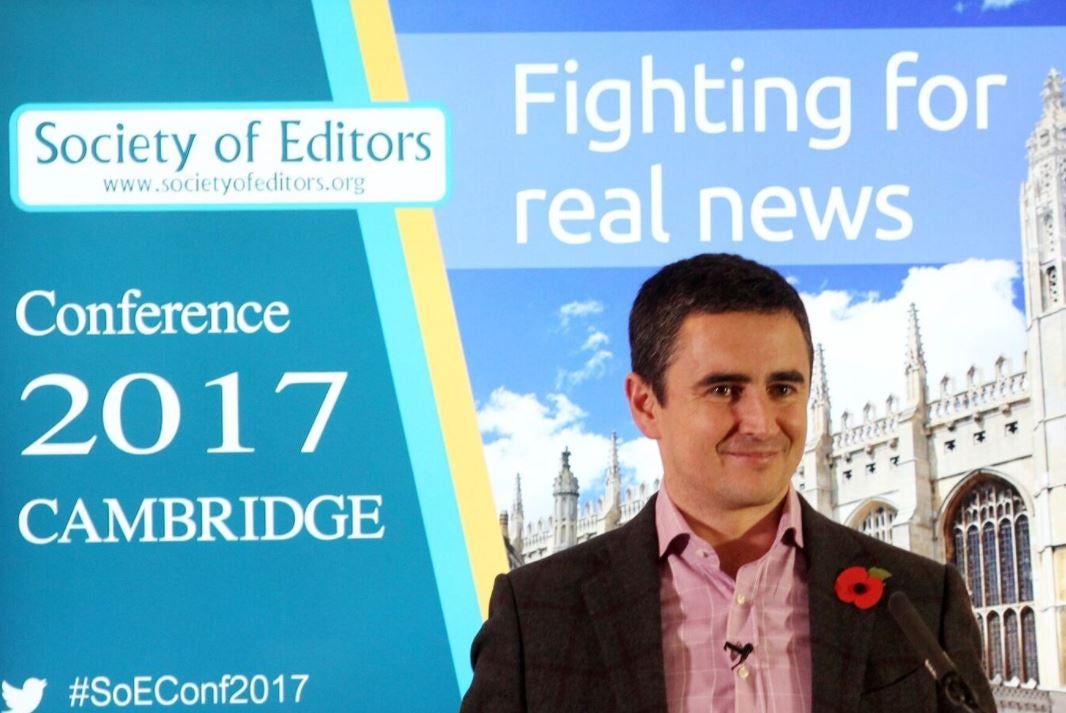
Google’s UK managing director Ronan Harris told editors last night that it is false to claim that the company is taking advertising from them.
This is despite the fact that UK national and regional newspapers have seen their share of advertising revenue decline from £5bn in 2005 to £2.3bn last year.
Over the same period, Google’s UK advertising revenue has increased from considerably less than £1bn in 2005 to more than £6bn last year.
Google and Facebook between them are reckoned to account for more than 80 per cent of the growth in UK online advertising.
Concerns about the pair’s growing dominance led Press Gazette to launch its Duopoly campaign highlighting concerns that they were destroying the journalism industry by depriving it of revenue.
Harris told the Society of Editors conference in Cambridge: “I’ve heard lots of people say that Google and Facebook are ‘ruthlessly stealing’ all the advertising revenue that publishers hoped to acquire through online editions.
“That analysis just isn’t right.
“First, it conflates two markets: search and display. The majority of Google’s revenue comes from showing highly relevant ads when you search for a particular term…Search advertising is not a market that news publishers have ever been in.
“Also – and this is important because we haven’t explained it clearly enough in the past – there is no advertising on Google News. Zero.
“Indeed you will rarely see advertising around news cycles in Google Search either…
“Second, let’s look at display, where publishers focus their efforts. In display advertising, Google is a supplier of ad inventory to newspaper websites.
“In every deal we do, without exception, the publisher keeps the majority of ad revenue — typically more than two thirds but often more. In short, we only make money if you’re making money.
“Every year we share billions of pounds in revenue with publishers globally. We also drove more than 10 billion clicks a month to publisher websites — for free — from Google Search and Google News.
“Both services are designed to get people off our site and onto the publisher’s so that you can make money from that audience.
“This is a completely different model to Facebook or Apple or any other walled garden. ”
Citing Deloitte research paid for my Google he said Google News generated traffic worth more than £650m last year to publishers in France, Spain, Germany and the UK.
Harris said: “I’m convinced it’s much better to work together than work against each other.
“Google and publishers share a common cause. We both believe in enabling access to information. At Google, we strongly believe in the power of news to record the truth, hold institutions and businesses to account, and make for a better-informed, freer, more open society.
“We have always seen ourselves as a partner to the news industry.”
Talking about the future he said that Google’s machine learning, or artificial intelligence, tools could benefit the news industry.
“Unlike traditional areas of computer science, with machine learning computers can iterate and improve at a phenomenal rate – and as a result they get better at helping people with questions and tasks…
“We think it can tackle real challenges for the news industry. On the demand side it can help find and understand readers and subscribers. On the supply side it can help to tackle the kind of toxicity online that reduces user engagement.
“We’re experimenting with a tool called Perspective which uses machine learning to spot abuse and harassment and helps moderate comments on news articles – freeing up editors’ time.
“We trained it by showing it millions of examples of abusive comments, thanks to partners including the New York Times and Wikipedia. It still has a long way to go, but we’re optimistic about what it can do.”
He said that Google had listened to concerns from publishers that “advertising alone cannot sustain high quality journalism”.
He said: “And as more and more people interact with news in different ways, we need to take advantage of new digital tools and capabilities to develop new experiences and sustainable business models.
“We’re eager to partner with you to create them. To work with you to tackle the challenges head on, because having a healthy media ecosystem is crucial to your business, to ours and to society.
“I firmly believe we are on the same side. To quote our chief business officer: ‘Live long and prosper, we come in peace!'”
Email pged@pressgazette.co.uk to point out mistakes, provide story tips or send in a letter for publication on our "Letters Page" blog
